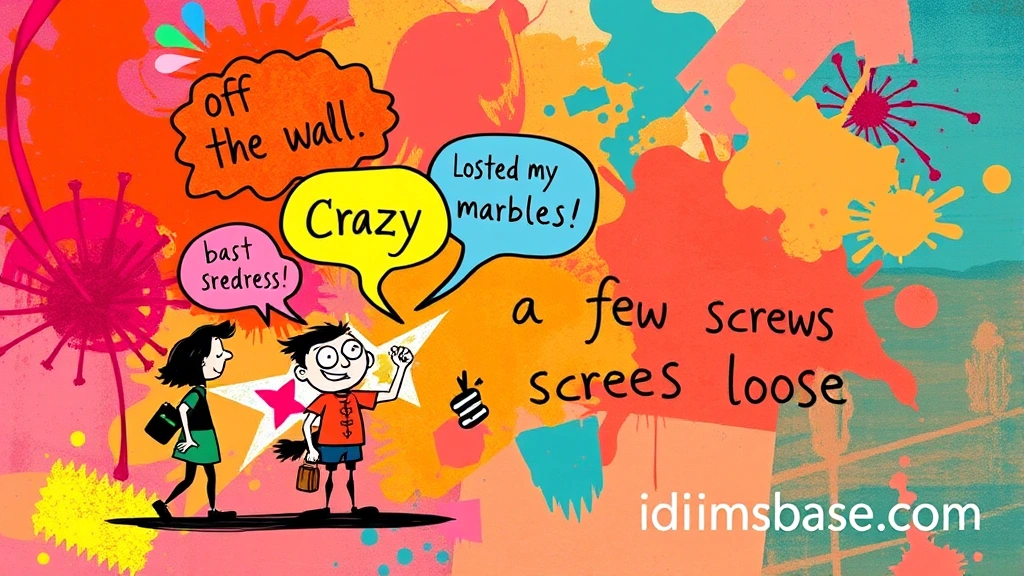Have you ever found yourself searching for just the right phrase to describe someone acting a little… well, out of the ordinary? Perhaps a friend is doing something hilariously absurd, or a character in a story is truly unhinged. English is brimming with colorful idioms that perfectly capture these moments! Forget just saying "crazy"; let's dive into a world of vibrant expressions that add flair, humor, and precision to your descriptions.
These idioms aren't just fun to say; they paint vivid pictures and often carry nuanced meanings. Whether you're a language learner looking to spice up your vocabulary, a writer seeking inspiration, or simply curious about the quirks of English, you're in for a treat. Get ready to explore 35 fantastic idioms for crazy people, ranging from the mildly eccentric to the truly wild!
35 Idioms for a "Crazy" Person
Here’s our curated list of idioms, complete with a little explanation to help you grasp their essence.
- Mad as a hatter: This one has historical roots, linked to mercury poisoning in hat-making. It means someone is extremely eccentric or insane.
- Off your rocker: Imagine a rocking chair without its rockers – unstable! This means someone is deranged or acting irrationally.
- Lose your marbles: "Marbles" here refers to one's sanity. If you lose them, you're going crazy.
- A screw loose: Just like a wobbly piece of furniture, someone with "a screw loose" isn't quite right in the head.
- Not playing with a full deck: A deck of cards is incomplete, symbolizing a mind that's not fully functional or intelligent.
- Out of your mind: This is a straightforward way to say someone is insane or acting wildly.
- Around the bend: Similar to a winding road, someone "around the bend" has gone a bit mad.
- Bonkers: A fun, informal word meaning crazy or insane.
- Daft as a brush: A slightly silly way to say someone is very foolish or stupid.
- Nutty as a fruitcake: Fruitcakes are dense and full of different things; this idiom implies someone is eccentric and a bit wild.
- Have bats in the belfry: Imagine bats flying erratically in a bell tower – it suggests a confused or deranged mind.
- Off the wall: Something "off the wall" is unconventional, erratic, or bizarre.
- One sandwich short of a picnic: A humorous way to say someone isn't very bright or is a bit crazy.
- Crackpot: A person with eccentric or irrational ideas.
- Loony tunes: From the cartoon, it describes someone behaving in a silly, crazy, or irrational way.
- Have a few kangaroos loose in the top paddock: A wonderfully Australian idiom, "top paddock" refers to the head.
- Cuckoo: Like the cuckoo bird that lays eggs in other birds' nests, this means someone is silly or insane.
- Wacky: Playfully eccentric or crazy.
- Gone stark raving mad: Emphasizes a complete and utter loss of sanity.
- Touched in the head: Implies a slight mental instability or eccentricity.
- Off your trolley: Similar to "off your rocker," suggesting mental instability.
- Have a screw loose: We already covered this, but it's so common it bears repeating!
- Not all there: A gentle way to say someone is mentally deficient or a bit odd.
- Crazy as a coot: A "coot" is a type of bird known for its erratic behavior.
- The lights are on but nobody's home: A humorous, slightly cruel way to say someone is unintelligent or dull-witted.
- Have a tile loose: Similar to "a screw loose," indicating mental instability.
- Certifiable: Implies someone is so crazy they could be officially certified as insane.
- Demented: Suffering from dementia; wildly irrational.
- Unbalanced: Lacking mental stability.
- Deranged: Disturbed or highly irrational.
- Lunatic: A person who is mentally ill (older term).
- Psychotic: Suffering from a severe mental disorder.
- Manic: Showing wild and apparently deranged excitement and energy.
- Having a brain cramp: A temporary mental block or confusion, often used humorously.
- Going postal: Becoming extremely and uncontrollably angry, often to the point of violence (though this one is more about rage than general "craziness").
Why Use These Idioms?
Using idioms like these adds so much flavor to your language! They:
- Create vivid imagery: "Bats in the belfry" paints a much clearer picture than "crazy."
- Convey nuance: Some are humorous, some are more serious, allowing you to choose the perfect fit.
- Show fluency: Using idioms naturally demonstrates a deeper understanding of English.
- Are fun! They make conversations and writing more engaging.

Key Takeaways
- English is rich with diverse idioms to describe someone acting "crazy."
- These idioms range from humorous and lighthearted to more serious, reflecting different degrees of eccentricity or mental instability.
- Using them can add vividness, nuance, and flair to your communication, making your English more expressive and engaging.
- Understanding the context and origin of these phrases can deepen your appreciation for the language.
Frequently Asked Questions
Q1: What's the difference between "mad as a hatter" and "off your rocker"?

A: While both imply craziness, "mad as a hatter" often suggests a more eccentric, perhaps even whimsical, kind of madness, often rooted in historical context. "Off your rocker" is more about a general instability or irrationality, implying someone has lost their grip on reality or common sense.
Q2: Are these idioms offensive?
A: The perceived offensiveness of these idioms can vary greatly depending on context, tone, and the specific idiom used. Many, like "nutty as a fruitcake" or "one sandwich short of a picnic," are often used lightheartedly or humorously among friends. However, some, particularly those that directly refer to mental illness (e.g., "lunatic," "psychotic," "demented"), can be considered insensitive or offensive, especially when used to mock or dismiss someone with genuine mental health struggles. It's always best to consider your audience and the situation before using them. When in doubt, err on the side of caution.
Q3: Can I use these idioms in formal writing?

A: Generally, no. Most of these idioms are informal and best suited for casual conversations, creative writing (like fiction or poetry), or informal articles. In formal academic papers, business reports, or professional correspondence, it's usually better to use more direct and literal language to ensure clarity and maintain a respectful tone.
Q4: Are there any regional differences in these idioms?
A: Absolutely! While many are widely understood across the English-speaking world, some have stronger regional ties. For example, "have a few kangaroos loose in the top paddock" is distinctly Australian. American English, British English, and other varieties each have their unique set of colorful expressions. This is part of what makes learning idioms so fascinating!
Q5: How can I learn to use these idioms naturally?
A: The best way is through exposure and practice!
- Read widely: Pay attention to how native speakers use these idioms in books, articles, and online content.
- Listen actively: Watch movies, TV shows, and podcasts.
- Practice speaking: Try incorporating one or two new idioms into your conversations each week. Don't be afraid to make mistakes; that's part of the learning process!
- Keep a phrasebook: Jot down idioms you encounter and their meanings.
Idioms are a delightful part of the English language, adding character and depth to our expressions. So go forth and use them (wisely, of course)! You'll find your conversations and writing becoming much more colorful and engaging.






